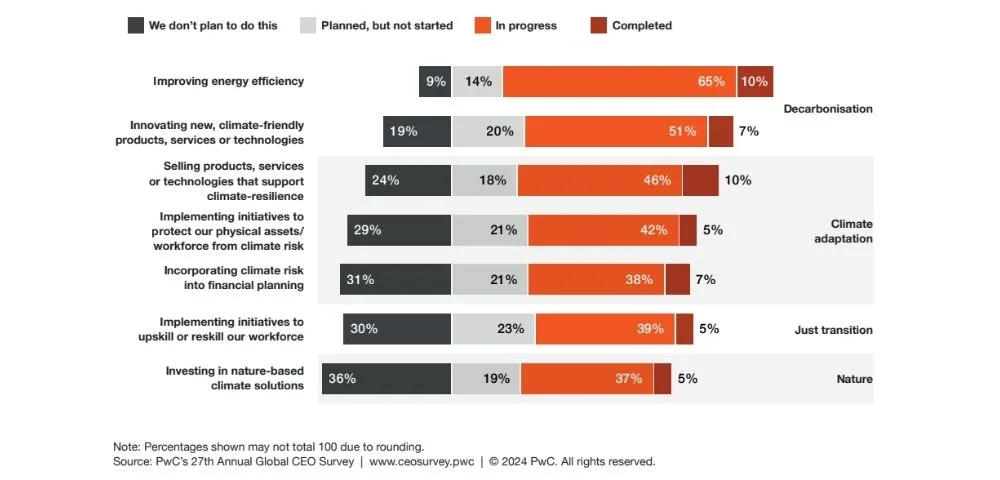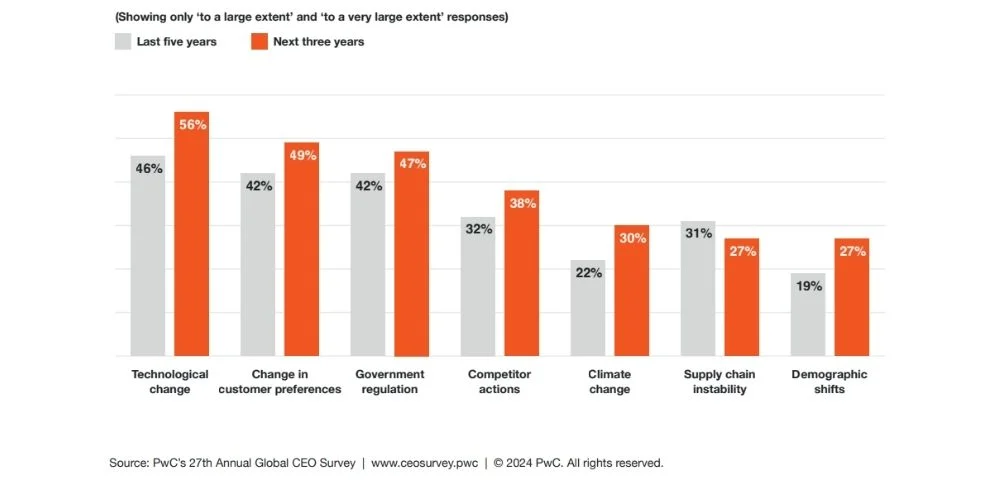The World Economic Forum, also known as the Davos Summit, concluded on January 19, 2024. The theme of this year was determined as "Rebuilding Trust." Participants delivered their speeches within four main topics. Although each topic was significant, as mentioned in the Global Risk Report 2024, climate change and sustainability issues drew considerable attention over the 10-year period.
PwC CEO Survey

The 27th annual survey conducted by PwC with CEOs took place this year. New data from PwC indicates that nearly 33% of CEOs anticipate that climate change will affect their companies' revenue in the next three years. CEOs are taking measures to address climate change by enhancing energy efficiency. About 66% have implemented initiatives to boost their business's energy efficiency, and an additional 10% have completed such programs. Approximately 50% are in the process of innovating climate-friendly products or services.

As indicated above, regarding the changes in the way companies create, deliver, and capture value over the past five years and the next three years, the factor with the highest increase is "Technological Change," followed closely by "Climate Change." However, when looking at the rate of increase, "Demographic Shift" is in the first place, while "Climate Change" is in the second place with a very close ratio.
Notable Speeches on Climate Changeat Davos
Ajay Banga stated on Wednesday, January 17th, that there is an "existential climate crisis," emphasizing that "a sense of urgency is our only savior." This message was reiterated throughout the week. John Kerry, in a session on what needs to be done after COP28, emphasized that business cannot continue as usual. He stated that we have the technology but are not deploying it fast enough. Jesper Brodin stressed that companies cannot continue to base future business models on the depletion of nature and resources, believing that companies doing so will not succeed.
In the context of the energy system, Fatih Birol also highlighted, "Companies not putting enough emphasis on energy efficiency will struggle to find their place in this competitive market." He emphasized that this is important not only for businesses but also to protect consumers from high bills, boost energy security, and reduce environmental impacts.
Failure to act on climate change is not only an issue for the planet but also a health crisis, as emphasized by Vanessa Kerry. Jane Goodall questioned the absurdity of destroying the only home we have.
However, as we make these changes, we must ensure that the transition is equitable. "The only way we can do it is through a just transition," stated Veronica Nilsson. This requires investment and financing, as explained by Ester Baiget. Or, as expressed by Kristalina Georgieva, it involves redirecting resources from where they cause harm to where they can provide help. Mariana Mazzucato agreed, stating that the issue is not a lack of finance but a 'massive misdirection.'
Luc Triangle reminded us that it's a question of trust: "Developed countries have to assist in the financing of climate action in developing countries because if we don't do that, this inequality will only grow, and you will have winners and losers... Rebuilding trust cannot be limited to only a number of countries. It has to include the whole world."
Widespread changes to infrastructure will also be necessary, as mentioned by Kyriakos Mitsotakis when discussing the investment needs for the European grid.






